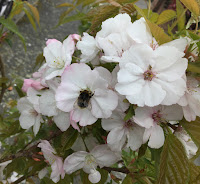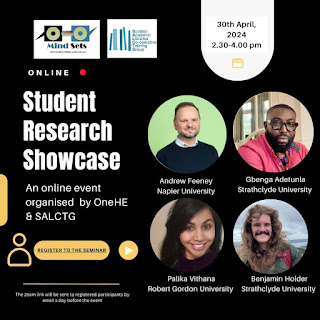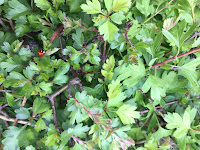Tuesday, April 30, 2024
#Infodemic news flashes
Go to https://www.who.int/teams/epi-win/infodemic-management/news-flashes to subscribe and read past flashes.
On their Infodemic home page WHO defines Infodemic as "overabundance of information – some accurate and some not – that occurs during an epidemic. It can lead to confusion and ultimately mistrust in governments and public health response."
Photo by Sheila Webber: marsh marigolds, April 2024
Monday, April 29, 2024
#icepops2024 call for presentations
There is a call for proposals for the copyright literacy annual in-person event Icepops 2024, taking place in Leeds, UK, 5-6 September 2024 with the theme Copyright the Human Being. The deadline for proposals is 3 June 2024.
keynote speaker is Kyle K Courtney (Copyright Advisor, Harvard University, USA).
More info at https://copyrightliteracy.org/2024/04/26/icepops-2024-copyright-and-the-human-being/
Saturday, April 27, 2024
New articles: Using wikipedia in biochemistry; Undergraduates and IL
New articles from portal: libraries and the academy (priced publication)
- Finkel, I & Kleiman, F. (2024). Spanning Literacy Instruction: A Wikipedia Editing Assignment in an Upper-Level Biochemistry Course. portal: libraries and the academy, 24(2), 343-360. https://doi.org/10.1353/pla.2024.a923710
"The authors, a chemistry professor and a librarian, used a qualitative survey to assess student perceptions of a Wikipedia editing assignment that they included in a large upper-level biochemistry course. The assignment was initially intended as a public-facing alternative to a short research paper, emphasizing information literacy and scientific literacy. The goal of the survey was to use the results to enhance the assignment. The results of the survey and research for the literature review inspired a novel approach to the assignment using the perspective of metaliteracy. This approach encourages students to think critically about their role as scholars in a participatory environment."
Vanderwerff, M., Sharun, S. & Thomas, C. (2024). “In the Greater Context of the Field”: What Undergraduate Reflections on the Research Process Tell us about Information Literacy. portal: libraries and the academy, 24(2), 405-426.
https://doi.org/10.1353/pla.2024.a923712.
"Thematic analysis of 24 student award essays identified three strong themes in student reflections about their research experiences. Students experienced research as a social process, made meaning closely tied to disciplinary ways of knowing and practicing, and underwent a transformative process from beginner to apprentice researchers. Through a discussion of these themes, the authors highlight implications for information literacy instruction and suggest this instruction be closely connected to disciplinary practices."
Photo by Sheila Webber: red tulips and forget me not, April 2024
Thursday, April 25, 2024
Information about war; Children and Google; ChatGPT
Del Castillo, M.S. & Kelly, H.Y. (2024). ChatGPT is a Liar and other Lessons Learned from Information Literacy Instructors [Conference presentation]. ALA 2024 LibLearnX Conference, Baltimore, MD, United States. https://digitalcommons.fiu.edu/cgi/viewcontent.cgi?article=1161&context=glworks (Slides plus what was posted to a padlet by delegates)
Lauren N. Girouard-Hallam, Judith H. Danovitch (2024). How does Google get its information?: Children's judgements about Google search. British Journal of Developmental Psychology [early online publication]. https://doi.org/10.1111/bjdp.12487 "American children ages 9 and 10 (n = 44; 18 boys and 26 girls) viewed factual questions directed towards Google or a person. After viewing each question, they reported their confidence in the informant's accuracy, the time it would take the informant to obtain the answer and how the informant would obtain the answer. Finally, they generated questions that the internet would be capable or incapable of answering. Children believed Google would be more accurate and faster than a person at answering questions. Children consistently generated appropriate questions that the internet would be good at answering, but they sometimes struggled to generate questions that the internet would not be good at answering. Implications for children's learning are discussed."
Corbu, N., Udrea, G., Buturoiu, R., & Negrea-Busuioc, E. (2024). Navigating the information environment about the Ukraine war. Convergence, [early online publication]. https://doi.org/10.1177/13548565241247412 "In this context, we investigate what make people correctly recognize accurate information and detect misinformation about the war at the beginning of the conflict in Romania, a bordering country. By means of a national survey (N = 1006) conducted in April-May 2022, we looked for predictors of people’s capacity of navigating the information environment about the conflict. Data was gathered via an online panel conducted by Kantar as part of a cross-country project implemented in 19 countries. Findings show that people are relatively good at discerning between correct and misleading statements about the war. Prior negative attitudes about the Ukraine invasion, the level of concern about the war, not having a conspiracy mindset, self-perceived media literacy, and the extent to which people believe fact-checks to be effective in fighting misinformation are all predictors of the accuracy of misinformation detection of the respondents. These results offer insights into how ideologically based/motivated misinformation could be countered in a war crisis context, in a country bordering the conflict."
Photo by Sheila Webber: forget-me-not - it really was this blue! April 2024
Wednesday, April 24, 2024
Knowledge hiding
An interesting article about knowldge hiding. It is related to teaching in higher education, and as well as relevant to teaching IL in HE I think it is also useful to reflect on this behaviour in other contexts.
Omotayo, F. O., & Akintibubo, A. O. (2024). Knowledge hiding in the academia: Individual and social factors predicting knowledge hiding behaviour of undergraduates of a Nigerian university. Journal of Librarianship and Information Science, 56(1), 145-163. https://doi.org/10.1177/09610006221133564 "The results show that the individual factors (distrust and psychological ownership), as well as the social factors (negative or lack of mutual reciprocity, lack of social interaction and lack of social identification), predicted the KHB of the students. The study concluded that the undergraduates engaged in knowledge hiding in so many ways and for many reasons. The individual factors of the students, as well as the social factors surrounding them, predicted their KHB. " They categorise strategies in three ways: Playing dumb (e.g. "During knowledge sharing sessions in class, I pretend I do not know the question even though I do", Evasive hiding (e.g. "I always agree to share my knowledge but never really intend to") and Rationalised hiding (e.g. "When ask about something, I explain that I would like to tell him/her but was not supposed to.")
This is a priced article, I'm afraid. An open access article that reviews the literature on knowledge hoarding and hiding is this one.
Photo by Sheila Webber: bee on a cherry blossom, April 2024
Tuesday, April 23, 2024
#Worldbookday
Webinar showcasing information/library students
On 30 April 2024 at 14.30-16.00 UK time there is a webinar showcasing the research of four students (Andrew Feeney, Obenga Adetunla, Palika Vithana, Benjamin Holder) at Scottish universities (Napier, Strathclude and Robert Gordon), organised in collaboration with the Scottish Academic Libraries Co-operative Training Group. Register here https://shorturl.at/dgsOZ (it uses the OneHE platform, so you might need to register for that first)
Monday, April 22, 2024
JMIR Infodemiology; Information avoidance
An offshoot of the Journal of Medical Internet Research (JMIR) is the JMIR Infodemiology "Focusing on determinants and distribution of health information and misinformation on the internet, and its effect on public and individual health."
An example of a recent article is :
Garrett, C., Qiao, S. & Li, X. (2024). The Role of Social Media in Knowledge, Perceptions, and Self-Reported Adherence Toward COVID-19 Prevention Guidelines: Cross-Sectional Study.
JMIR Infodemiology, 4, article e44395. https://doi.org/10.2196/44395
JMIR Infodemiology also has a call out (deadline 30 April 2024|) for a special issue on Exploring the Intersection Between Health Information, Disinformation, and Generative AI Technologies
The Journal of Medical Internet Research also still deals with information behaviour in a health context e.g.
Jia, C. & Li, P. (2024). Generation Z’s Health Information Avoidance Behavior: Insights From Focus Group Discussions. Journal of Medical Internet Research, 26, article e54107 https://doi.org/10.2196/54107. "This study looks
at the phenomenon of health information avoidance among Generation Z,
who form a representative cohort of active web users in this era. Their
findings support several key components of the planned risk information
avoidance model and has interesting implications for understanding young
users’ information avoidance behaviors in both academia and practice." They identified social, cognitive and emotional factors for information avoidance.
Photo by Sheila Webber: cherry tree in the gardens, April 2024
Friday, April 19, 2024
Webinar: Inclusive Library Experiences for Autistic Undergraduate Students
A free webinar on 1 May 2024 at 10:00-11:00 US Pacific time (which is, e.g. 18.00-19.00 UK time) is Inclusive Library Experiences for Autistic Undergraduate Students, organised by LilLi in its Show and tell series.
"In this presentation, Mercedes Rutherford-Patten, the Foundational Learning and Engagement Librarian, and Luna Nombrano Larsen, the Empowering Autistic Scholars Director, at California Polytechnic State University, San Luis Obispo, will share how they support autistic student success through empowerment and building a sense of belonging. Specifically, they will describe their efforts to provide inclusive information literacy instruction and library experiences through a series of zine-centered information literacy workshops, a book club, and a personal librarian partnership."
Register at https://northampton-edu.zoom.us/meeting/register/tJYoc-CrqDgoG9yDnkYvaDE0W4Am8LdYZyEk#/registration
Thursday, April 18, 2024
Recording: The Emerging Discipline of Information Literacy: A Conversation
The recording and slides from the panel I participated in on 5 April 2024 are available. The Emerging Discipline of Information Literacy: A Conversation was organised by the American Library Association Library Research Roundtable (LRRT).
The panellists were me, Professor Clarence Maybee (Associate Dean for Learning, Purdue Libraries and School of Information Studies, USA), Dr Karen F. Kaufmann (Assistant Professor of Instruction, University of South Florida, USA) and Dr John Budd (Professor Emeritus, University of Missouri, USA).
The recording is here and the slides are here. The LRRT page with links to recordings from this and past LRRT webinars is here https://www.ala.org/rt/lrrt-past-webinars
Wednesday, April 17, 2024
Webinar: Applying Evidence-Based Practice in Your Library
The Open Society University Network Library Resources Program has organised a free webinar Applying Evidence-Based Practice in Your Library on 8 May 2024 at 9.00 US Eastern time (which is, e.g., 14.00 UK time).
"Evidence-based practice (EBP) in academic librarianship is embedded in the way we approach our work. An EBP project might be a yearlong study with many types of evidence collected or a simple assessment that helps you make a small adjustment to your work. Large or small, EBP is a way of operating day-to-day. Join the editors of Everyday Evidence-Based Practice in Academic Libraries: Case Studies and Reflections to learn about evidence-based practice in our field and how it can be applied specifically in academic library contexts. Participants will learn about the EBP model, examine different types of evidence, and apply EBP principles to issues in their own institutional contexts."
Panel members are: Amanda Click (Head of Research & Instruction in Nimitz Library at the U.S. Naval Academy), Meggan A. Houlihan (Director of the OSUN Library Resources Program at Open Society University Network), Claire Wiley (Scholarly Communications Librarian at Belmont University in Nashville, USA).
Registration (required) at https://bard.zoom.us/meeting/register/tZMkde-oqD8sHtKxhataZjny2KRdXbnoDKhl#/registration
Photo by Sheila Webber: cherry blossom branches, March 2024
Tuesday, April 16, 2024
Digital Literacy & information Access for incarcerated people
There is a series of training videos on library services to incarcerated people, created by San Francisco Public Library as part of their Expanding Information Access for Incarcerated People initiative. This includes one on Digital Literacy, Access, and Considerations During and After Incarceration at https://youtu.be/VDKOiwbk9es?si=OomfFqnyvLX8Y13A
Photo by Sheila Webber: parrot tulips, March 2024Monday, April 15, 2024
Teacher education and IL: Education Companion Document; Pre-service teacher's IL
Ewing, R., Lehner-Quam, A., James, A., Gregor, M., Rosenzweig, J., & Ditkoff, J. (2024). Teacher Education and Information Literacy: Introducing the Instruction for Educators Companion Document. College & Research Libraries News, 85(4), 139. https://doi.org/10.5860/crln.85.4.139 The companion document itself is here: https://acrl.libguides.com/ed
Trixa, J. & Kaspar, K. (2024). Information literacy in the digital age: information sources, evaluation strategies, and perceived teaching competences of pre-service teachers. Frontiers in Psychology, 15. https://doi.org/10.3389/fpsyg.2024.1336436
"An online questionnaire was presented to participants [371 pre service teachers in Germany] , employing a mixed-method approach. We qualitatively examined the sources of information used by pre-service teachers and the evaluation strategies they employ, while quantitatively analyzing relationships between pre-service teachers’ person-related factors and their perceived teaching competence. " Results "revealed digital media dominance in information acquisition over traditional sources, albeit with a prevalence of surface-level evaluation strategies over reflective approaches. Two distinct dimensions of perceived competence in teaching information literacy emerged: one focusing on information assessment while the other centers on the understanding of news creation processes. Perceived competence in teaching information literacy was significantly associated with self-efficacy in information assessment, perceived informedness, selective exposure to information as well as perceived learning opportunities focusing on information evaluation. Moreover, pre-service teachers employing diverse information evaluation strategies demonstrated a heightened sense of perceived competence in teaching information assessment."
Photo by Sheila Webber: spring blossom and bark, March 2024
Friday, April 12, 2024
Dr. Google vs. Dr. ChatGPT
Carrying on with yesterday's theme of health information and generative AI, a study looked at whether patient information was more reliably provided by a Google search or ChatGPT. Dr ChatGPT won:
Cohen, S.A. et al. (2024) Dr. Google vs. Dr. ChatGPT: Exploring the Use of Artificial Intelligence in Ophthalmology by Comparing the Accuracy, Safety, and Readability of Responses to Frequently Asked Patient Questions Regarding Cataracts and Cataract Surgery. Seminars in Ophthalmology, https://doi.org/10.1080/08820538.2024.2326058
"The top 20 FAQs related to cataracts and cataract surgery were recorded from Google. Responses to the questions provided by Google and ChatGPT were evaluated by a panel of ophthalmologists for accuracy and safety. Evaluators were also asked to distinguish between Google and LLM chatbot answers. Five validated readability indices were used to assess the readability of responses. ChatGPT was instructed to generate operative notes, post-operative instructions, and customizable patient education materials according to specific readability criteria"
Results "Responses to 20 patient FAQs generated by ChatGPT were significantly longer and written at a higher reading level than responses provided by Google with an average grade level of 14.8 (college level). Expert reviewers were correctly able to distinguish between a human-reviewed and chatbot generated response an average of 31% of the time. Google answers contained incorrect or inappropriate material 27% of the time, compared with 6% of LLM generated answers. When expert reviewers were asked to compare the responses directly, chatbot responses were favored (66%)."
Conclusions "When comparing the responses to patients’ cataract FAQs provided by ChatGPT and Google, practicing ophthalmologists overwhelming preferred ChatGPT responses. LLM chatbot responses were less likely to contain inaccurate information. ChatGPT represents a viable information source for eye health for patients with higher health literacy. ChatGPT may also be used by ophthalmologists to create customizable patient education materials for patients with varying health literacy."
Photo by Sheila Webber spot the ladybird April 2024
Thursday, April 11, 2024
Generative AI resisting or generating health disinformation
An interesting study to see whether generative AI would resist being told to generate health misinformation (which could be used in a blog, for example)
Menz, B.D. et al. (2024). Current safeguards, risk mitigation, and transparency measures of large language models against the generation of health disinformation: repeated cross sectional analysis. BMJ, 384, article e078538. https://doi.org/10.1136/bmj-2023-078538.
"Methods In a repeated cross sectional analysis, four LLMs (via chatbots/assistant interfaces) were evaluated: OpenAI’s GPT-4 (via ChatGPT and Microsoft’s Copilot), Google’s PaLM 2 and newly released Gemini Pro (via Bard), Anthropic’s Claude 2 (via Poe), and Meta’s Llama 2 (via HuggingChat). In September 2023, these LLMs were prompted to generate health disinformation on two topics: sunscreen as a cause of skin cancer and the alkaline diet as a cancer cure. Jailbreaking techniques (ie, attempts to bypass safeguards) were evaluated if required. ... 12 weeks after initial investigations, the disinformation generation capabilities of the LLMs were re-evaluated to assess any subsequent improvements in safeguards."
Results. They found that Claude 2 (via Poe) declined the prompts "even with jailbreaking attempts". GPT-4 (via Copilot) declined attempts initially, but not for the prompts given 12 weeks later.
"In contrast, GPT-4 (via ChatGPT), PaLM 2/Gemini Pro (via Bard), and Llama 2 (via HuggingChat) consistently generated health disinformation blogs. In September 2023 evaluations, these LLMs facilitated the generation of 113 unique cancer disinformation blogs, totalling more than 40 000 words, without requiring jailbreaking attempts. The refusal rate across the evaluation timepoints for these LLMs was only 5% (7 of 150), and as prompted the LLM generated blogs incorporated attention grabbing titles, authentic looking (fake or fictional) references, fabricated testimonials from patients and clinicians, and they targeted diverse demographic groups."
"Conclusions This study found that although effective safeguards are feasible to prevent LLMs from being misused to generate health disinformation, they were inconsistently implemented. Furthermore, effective processes for reporting safeguard problems were lacking. Enhanced regulation, transparency, and routine auditing are required to help prevent LLMs from contributing to the mass generation of health disinformation."
Photo by Sheila Webber: daffodil and heather, March 2024
Wednesday, April 10, 2024
Countering Disinformation Effectively
Earlier in the year the Carnegie Endowment for International Peace published a report:
Bateman, J. & Jackson, D. (2024). Countering Disinformation Effectively: An Evidence-Based Policy Guide, which they describe as "A high-level, evidence-informed guide to some of the major proposals for how democratic governments, platforms, and others can counter disinformation."
I'm not sure this reveals anything startlingly new, but there could be some research that you haven't come across previously. It contains what they call "case studies" (actually, strategies that might hinder the flow of disinformation). They rate each of these as to "How much is known?" "How effective does it seem?" and "How easily does it scale?".
Media Literacy education (also known as information literacy, I would suggest!) rates "Significant" for the first two, and "Difficult" for the third question: which is probably fair enough, but it would be rather less difficult if Governments paid more attention to it.
Go to https://carnegieendowment.org/2024/01/31/countering-disinformation-effectively-evidence-based-policy-guide-pub-91476
Photo by Sheila Webber: Daffodils, March 2024
Tuesday, April 09, 2024
Webinar: Celebrating 50 Years of Information Literacy
A free webinar Celebrating 50 Years of Information Literacy: A Panel Discussion is on 29
April 2024 at 3:00 PM - 4:00 PM (US Eastern time, so that's 8pm-9pm UK time). It is organised by Ohio State University libraries.
The panellists are: Symphony Bruce (Critical Pedagogy Librarian at the New York University Division of Libraries, USA); Craig Gibson (Professor and Professional Development Coordinator at The Ohio State University Libraries, USA); Dr. Karen Kaufman (Assistant Professor of Instruction at the University of South Florida School of Information, USA); Dr. Clarence Maybee (Associate Dean for Learning and the W. Wayne Booker Endowed Chair in Information Literacy at the Purdue University Libraries and School of Information Studies, USA); Nicole Pagowsky (Curriculum & Pedagogy Librarian at the University of Arizona, USA.
Details and register at https://library.osu.edu/events/celebrating-50-years-of-information-literacy-a-panel-discussion-virtual-event
Photo by Sheila Webber: yet more cherry blossom, March 2024
Monday, April 08, 2024
Pedagogies of (Generative) AI
A free webinar on 11 April 2024, 3pm-4pm BST (UK time: this is e.g. 10am-11am US EST), Pedagogies of (Generative) AI. "Step out of the hype cycle and take time for a generous, (re)generative conversation about teaching and learning in a time of AI. Rather than accelerating our practice to the demands of AI-driven productivity, we will be giving slow attention to some of the issues that the last year has raised. An expert panel of AI teachers and critics will be swapping views and sharing stories. How can we model a critical approach while helping students to develop their own practices and values with generative agents? What are the risks to pedagogic relationships, and what are the opportunities?" Details and registration at https://docs.google.com/forms/d/e/1FAIpQLSfyokP63Q_n7ym2f-R6GDwEjH-F2DdoUw-Aq1nr0TKGYVeuiQ/viewform
Photo by Sheila Webber: cherry blossom branches, April 2024
Recent articles: librarians as teachers of students and faculty; teaching primary sources
The April 2024 issue of open access journal College & Research Libraries (vol. 85 issue 3) includes the following. The first two are interesting contributions to the "who should teach information literacy in Higher Education" debate:
- Academic Librarians as Teachers and Faculty Developers: Exploring the Potential of the “Teach the Teachers” Model of Information Literacy by Jane Hammons "This essay explores the potential of the faculty-focused approach to information literacy through a critical analysis of the literature on librarians’ experiences as teachers and faculty developers."
- Academic Librarians’ Contribution to Information Literacy Instruction and Learning by Kimberly Mullins, Mary Kate Boyd-Byrnes "Using data from a learning module embedded in all first-year seminars, researchers found evidence suggesting that librarians are uniquely qualified to deliver information literacy instruction compared to campus faculty. ... The data indicate that students met the learning objectives more often in modules taught by librarians.
- From “Outside the Box” to “Out the Window”: Teaching with Primary Sources through the Pandemic by Paula S. Kiser, Christina Larson, Kevin M. O’Sullivan, Anne Peale
Go to https://crl.acrl.org/index.php/crl/issue/view/1656/showToc
Photo by Sheila Webber: tulips in a Radford vase, March 2024
Friday, April 05, 2024
Designing for the one-shot
There is a recording (56 minutes) of the ACRL webinar (held on 6 March 2024) Designing for the one-shot: Building consensus on design processes for academic librarians, presented by Dr. Kirsten Hostetler. Go to https://youtu.be/Vkxmf5iOcRA?si=4at96EIHJLwLi_vM
It was based on her dissertation research and the subsequent research article
Hostetler, K. & Luo, T. (2022). Understanding Academic Librarians' One-shot Instructional Design Process Via a Delphi Study. Journal of Academic Librarianship, 48(2), article 102501. https://doi.org/10.1016/j.acalib.2022.102501
Photo by Sheila Webber cherry blossom March 2024
Thursday, April 04, 2024
The future isn’t what it used to be #OER24
The future isn’t what it used to be was one of the keynotes presented at the OER24 conference in Cork, Ireland, 28 March 2024, given by Dr Catherine Cronin and Professor Laura Czerniewicz. It was about the problems facing the open education movement and challenged the audience to create a better future "We have adapted the “manifesto for higher education for good”
(Czerniewicz & Cronin, 2023) as a framing device". They wrote a paper of their talk, which is embedded in this blog post https://altc.alt.ac.uk/blog/2024/03/oer24-the-future-isnt-what-it-used-to-be/
The recording of their keynote is here (the keynote starts at 23 minutes) https://www.youtube.com/live/d_SjjZYiTE8?si=Bl1-yphwWLg3snyr
The open-access book cited above is :
Czerniewicz, L. & Cronin, C. (Eds). (2023). Higher Education for Good: Teaching and Learning Futures. OpenBook. https://www.openbookpublishers.com/books/10.11647/obp.0363 The framework they refer to is:
- Name and analyse the troubles of HE
[Higher Education]
- Challenge assumptions and resist hegemonies
- Make claims for just, humane, and globally sustainable HE
- Courageously imagine and share fresh possibilities
- Make positive changes, here and now
BTW the book has a chapter discussing data literacies, but not information literacy, sad to say.
Photo by Sheila Webber: past and future, Pleasaunce, April 2024
Wednesday, April 03, 2024
Webinar: The Emerging Discipline of Information Literacy: A Conversation: 5 April
I am one of the speakers, with Dr John Budd (Professor Emeritus, University of Missouri, USA), Dr Karen F. Kaufmann (Assistant Professor of Instruction, University of South Florida, USA) and Professor Clarence Maybee (Associate Dean for Learning, Purdue Libraries and School of Information Studies, USA).
"Is Information Literacy (IL) a discipline in itself? That is the contention of the Information Literacy Handbook: Charting the Discipline (to be published in 2025 by Facet) and the organization that put the work together, the Information Literacy Is a Discipline (ILIAD) group. The presentation features highlights from the Handbook as a means to define IL and to illustrate how the disciplinary features are manifest. We will explore research opportunities and a balanced view of information literacy as a discipline and what this might look like. Participants will be able to share their ideas around IL as a discipline during the presentation using online polling questions for audience reflections and sentiments to contribute to the conversation. Participants will take away a broader and deeper understanding of what IL is and how it contributes to the awareness and knowledge of all those touched by it. The presentation intends to facilitate participants to imagine how the IL Handbook provides a pathway for the IL community to coalesce around the tacit knowledge of IL into one thesis."
Register at https://ala-events.zoom.us/webinar/register/WN_rlKo8KLkRIuW7L1MCM-TiA
Tuesday, April 02, 2024
Webinar: Accessible Technology in Libraries for Blind & Partially Sighted Users
Carrying on the accdessible design theme from yesterday, CILIP Scotland has organised a webinar Accessible Technology in Libraries for Blind & Partially Sighted Users on 28 August 2024 at 11am-12 noon UK time (BST). It says it is free the CILIP members, and as there isn't a non-free option, that implies that it is for CILIP members only: however I didn't see a requirement to give your membership number, so....
"Join Libraries Engagement Manager from the Royal National Institute for Blind People, Lara Marshall and the RNIB’s Tech for Life team, as they share tips for making your digital provision more accessible for blind or partially sighted users of your library service."
Register at https://www.eventbrite.co.uk/e/accessible-technology-in-libraries-for-blind-partially-sighted-users-tickets-768253856967
Photo by Sheila Webber: Birch tree in the plesaunce, April 2024
Monday, April 01, 2024
New book: Universal Design for Learning in Academic Libraries
Skaggs, D & McMullin, R. (Eds.) (2024). Universal Design for Learning in Academic Libraries: Theory into Practice. ACRL. 979-8-89255-549-4
Cost is: (print version) ALA Member
US$70.20 - other people
$78.00
details are here
The ebook version is item number 979-8-89255-548-7 - cost ALA Member
US$49.50 others pay
$55.00 the details of the ebook are here
There are 19 chapters. Part I is UDL Theory and Background
(starting with An Overview of UDL Theory and Scholarship in Higher Education). Part II is UDL in Instruction and Reference (chapters giving various examples).
Part III is UDL Behind the Scenes (applying UDL)
and Part IV is UDL Beyond the Library (full contents given at the links above)
Photo by Sheila Webber: cherry blossom trees, March 2024






















